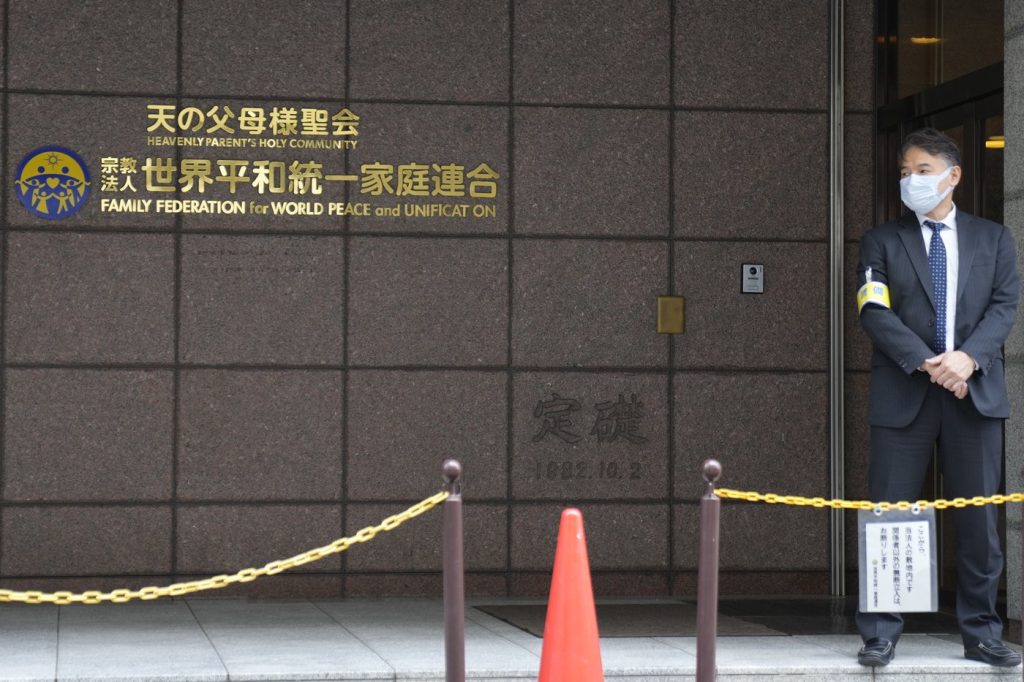TOKYO (AP) – A Tokyo court has ordered the dissolution of the Unification Church, a controversial South Korean religious organization with significant political ties in Japan. This ruling comes after the church was accused by the Japanese government of engaging in manipulative fundraising practices and coercive recruitment tactics that instilled fear among its members and caused harm to their families. The decision effectively revokes the church's legal status and tax-exempt status in Japan, paving the way for it to liquidate its assets. In response to the ruling, the church announced it is contemplating an appeal to the Supreme Court of Japan.
The legal action against the Unification Church follows a series of lawsuits from families who allege that the organization exploited its members, resulting in significant financial losses due to coerced donations. Despite these accusations, the church had previously evaded serious scrutiny and had maintained close associations with the ruling Liberal Democratic Party of Japan for decades. This dynamic shifted in the aftermath of the assassination of former Prime Minister Shinzo Abe in 2022. The alleged assassin reportedly held grievances tied to Abe's connections to the Unification Church, claiming it had financially ruined his family. This incident triggered an outcry and subsequent probes into the church's operations and its ties to political figures.
The Unification Church, officially known as the Family Federation for World Peace and Unification, was founded in Seoul in 1954 by Rev. Sun Myung Moon, who positioned himself as a messiah and offered new interpretations of the Bible. The organization is known for its strong anti-communist stance and advocates for the unification of the Korean Peninsula. It has gained notoriety for conducting mass weddings, where participants are paired off, often from different nationalities, and has established a substantial global following, including hundreds of thousands of adherents in Japan.
Historically, the church has faced serious allegations of employing deceptive recruiting strategies and exerting psychological pressure on its members to transfer a significant portion of their incomes to the organization. The church, however, denies these claims, arguing that many new religious movements encounter similar allegations during their formative years. Reports suggest that Japanese followers are particularly urged to atone for ancestral sins associated with Japan’s colonial rule over Korea from 1910 to 1945, with a considerable amount of the church's global revenue stemming from Japan.
The Tokyo court's decision to dissolve the Unification Church was prompted by a petition from the Japanese Education Ministry, which described how the church used manipulative tactics to influence its followers' decisions, pressured them to acquire overpriced goods, and solicited donations that exceeded their financial means, resulting in fear and distress for both members and their families. The ruling, issued on a Tuesday, indicated that the church's issues were extensive and ongoing, asserting that a dissolution order was warranted as the church was unlikely to effect voluntary reforms.
This court order marks a historical moment as the Unification Church becomes the first group to be targeted for dissolution under Japan’s civil code, a distinction that previously applied only to criminal cases involving cults like Aum Shinrikyo, notorious for its sarin gas attack in 1995. The church's representatives have denounced the petition as a severe infringement on religious freedom and claimed that the legal interpretation used to reach this decision was flawed and unjust.
The scrutiny facing the Unification Church resulted significantly from Abe's assassination, which unveiled decades of entangled relationships between the church and Japan's ruling Liberal Democratic Party. The alleged assassin had cited financial ruin due to his mother's excessive donations to the church as a motivating factor behind his crime, further intensifying public criticism of both the church and its political affiliations.
Founded by Moon, who was also convicted of tax evasion in 1982 and later died in 2012, the Unification Church has enjoyed connections with several global political leaders, including numerous U.S. presidents and figures in North Korea. Moon's outreach efforts included dialogues with North Korea's Kim Il Sung, where he attempted to persuade the leader to abandon nuclear ambitions.











